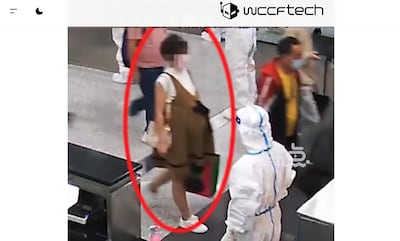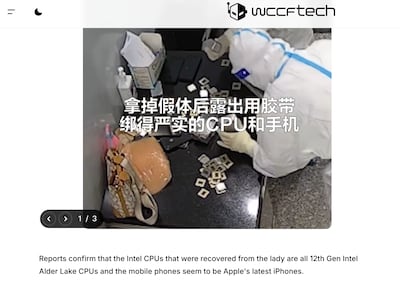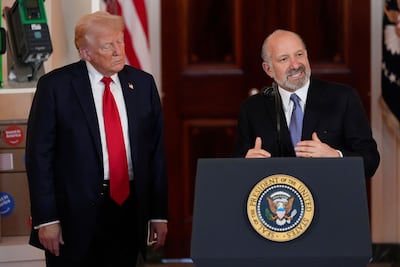A recent decision by US AI company Anthropic to defend disputed chip export rules is continuing to reverberate throughout the technology world, and part of the support for its decision comes from an unusual area.
Anthropic's stance has put it at odds with other American technology heavyweights such as Microsoft and Nvidia, which have worked in recent months to convince the Trump administration to completely overhaul chip export policies that seek to maintain the US lead in AI by making it more difficult for other countries, mainly China, to obtain powerful chips.
"In some cases, smugglers have employed creative methods to circumvent export controls, including hiding processors in prosthetic baby bumps and packing GPUs [graphics processing units] alongside live lobsters," read a policy letter by Anthropic.

In the footnotes of Anthropic's letter, it sources the prosthetic baby bump and lobster chip-smuggling story to WCCF Tech, a technology news forum established in 2004.
"While at the port, the Chinese customs authorities noticed something was off about the woman and asked her for inspection," reads the story posted in 2022.
"After having the fake belly removed, the customs authorities found a total of 202 Intel CPUs and 9 mobile phones within the fake prosthetic."
Anthopic sourced a 2023 story in PC Mag in which Hong Kong authorities reportedly stopped people who were trying to smuggle 70 graphics cards in a cargo box containing live lobsters.
That portion of its letter to the White House irked AI-chip powerhouse Nvidia, with a representative of the company accusing Anthropic of lying.

"American firms should focus on innovation and rise to the challenge, rather than tell tall tales that large, heavy, and sensitive electronics are somehow smuggled in ‘baby bumps’ or ‘alongside live lobsters," a statement from the Nvidia representative said.
Both instances cited by Anthropic are somewhat dated and nowhere near powerful enough to be accurately compared the highly sought after CPUs and GPUs often required for AI purposes.
For instance, Nvidia's much touted Blackwell system is approximately the size of a car, and therefore not exactly easy to smuggle.
All that said, on May 15, the chip export policies drafted under former president Joe Biden's administration will go into effect.
Under the proposed rules, countries would be split into tiers that would determine how many powerful chips and GPUs they could buy.
Falling into the first tier and largely unaffected by the rules are Australia, Belgium, Canada, Denmark, Finland, France, Germany, Ireland, Italy, Japan, the Netherlands, New Zealand, Norway, South Korea, Spain, Sweden, Taiwan and the UK.
Other countries, such as Switzerland, Poland, Greece, Singapore, India, Indonesia, Israel, the UAE and Saudi Arabia, would fall into a second-tier category, making it more difficult – although not impossible – to obtain the chips needed for AI research and development.

The third tier of countries – China, Iran, North Korea, Russia, Syria and Venezuela – will have the most difficulty obtaining GPUs and CPUs under the new rules, if they are applied.
Early in 2025, US technology and AI giants such as Microsoft and Nvidia came out strongly against the diffusion rules, saying that they would backfire, and limit US tech influence in the world.
Meanwhile, some countries seem to making progress in trying to buy chips for non-frontier AI uses without burdens or limits.
According to a source, US President Donald Trump's administration is considering exempting the UAE from most of the policies through a deal involving Nvidia.

Those options could include giving Nvidia the ability to sell chips to the UAE without restrictions, although other ideas are also being discussed.
The development comes as Mr Trump prepares for his visit to the UAE.
Other governments are still in wait-and-see mode.
"We have substantive concerns with it," said a source representing a country falling into the second tier of the proposed chip export rules.
The source said that the limited ability to acquire AI semiconductors and GPUs could severely affect the country's desire to build more data centres.
"We’re one of the largest hubs for data centres and they had no idea about that," the source said, referring to concerns raised with the White House when the AI diffusion rules were announced towards the end of the Biden administration.
Although Anthropic's stance of mostly supporting the rules stands out in the technology community, there is nuance in its letter to the Trump administration.
The technology company, largely viewed as a competitor to OpenAI, said that the chip export tier system should be tweaked.
"We suggest allowing countries in Tier 2 with robust data centre security to obtain more chips through government-to-government agreements that prevent smuggling and align technology controls," Anthropic wrote, without naming countries or defining "robust" data centre security.


